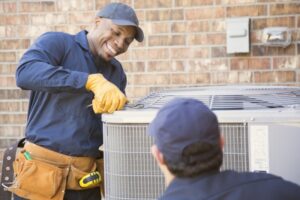
There’s no denying that when you live in our area, having a fully functional and efficiently operating air conditioner is an absolute necessity. Your cooling system gets quite the workout during this time of the year. And you want a sturdy one that can get the job done!
Of course, the only way to really ensure that yours will stay in excellent shape is if you take good care of it and use it as efficiently as possible. But how do you know if you are using it efficiently, and how do you know if your AC use is doing harm to the system or not?
First off, if you feel you’re paying more than you should on your energy bills each summer, chances are you could stand to boost AC efficiency. And by boosting AC efficiency you could also prevent unnecessary AC repairs. Read on to learn more.
Raise the Temperature of Your Thermostat
Don’t worry, we don’t want you to make it any warmer than necessary inside your home. But there is a good chance that you may be keeping the thermostat down at a level you don’t really need it to be! Lower thermostat settings don’t actually provide you with cool air any faster, they just cause the air conditioner compressor to run longer, and inefficiently so.
We suggest that you set the thermostat at 78°F during the day, instead of trying to achieve cold air faster by setting it all the way down to 72°F or lower.
Clear the Space Surrounding the Outdoor AC Unit
The outdoor air conditioner unit is where the system’s compressor sits. This component, along with the refrigerant that runs through it, is tasked with actually providing cooling to your home. However, if the outdoor unit is bogged down with too much debris such as leaves, lawn mulch, twigs, etc, it can cause airflow to be restricted.
What happens is that your air conditioner then can’t work as efficiently as possible, and will run longer to compensate, exacerbating wear and tear and leading to repair needs.
Clean Off the Room Vents
Take a quick walkthrough of your home and ensure that all the vents are fully open, and none of them are blocked by things like rugs, curtains, furniture, etc. Use a low-powered vacuum hose to clean off dirt and lint from the register so the ventilation system can “breathe” easier.
Change the Air Filter
There’s a pretty common misconception among homeowners that the air filter that comes standard with their HVAC system is there to protect the home’s indoor air quality. It doesn’t hurt indoor air quality, but its purpose is actually to protect the HVAC system itself from dust, dirt, and other debris that can get inside and damage the components.
When this air filter gets too blocked up, it can restrict airflow and cause efficiency problems. You should change your air filter on your own every 1–3 months, depending on the type of filter you have and how often you use your air conditioner—which for homeowners around here is a considerable amount!
For reliable air conditioning repair in Elk Grove, contact Sierra Pacific Home & Comfort, Inc.: “The Guys in the Big Red Trucks”
